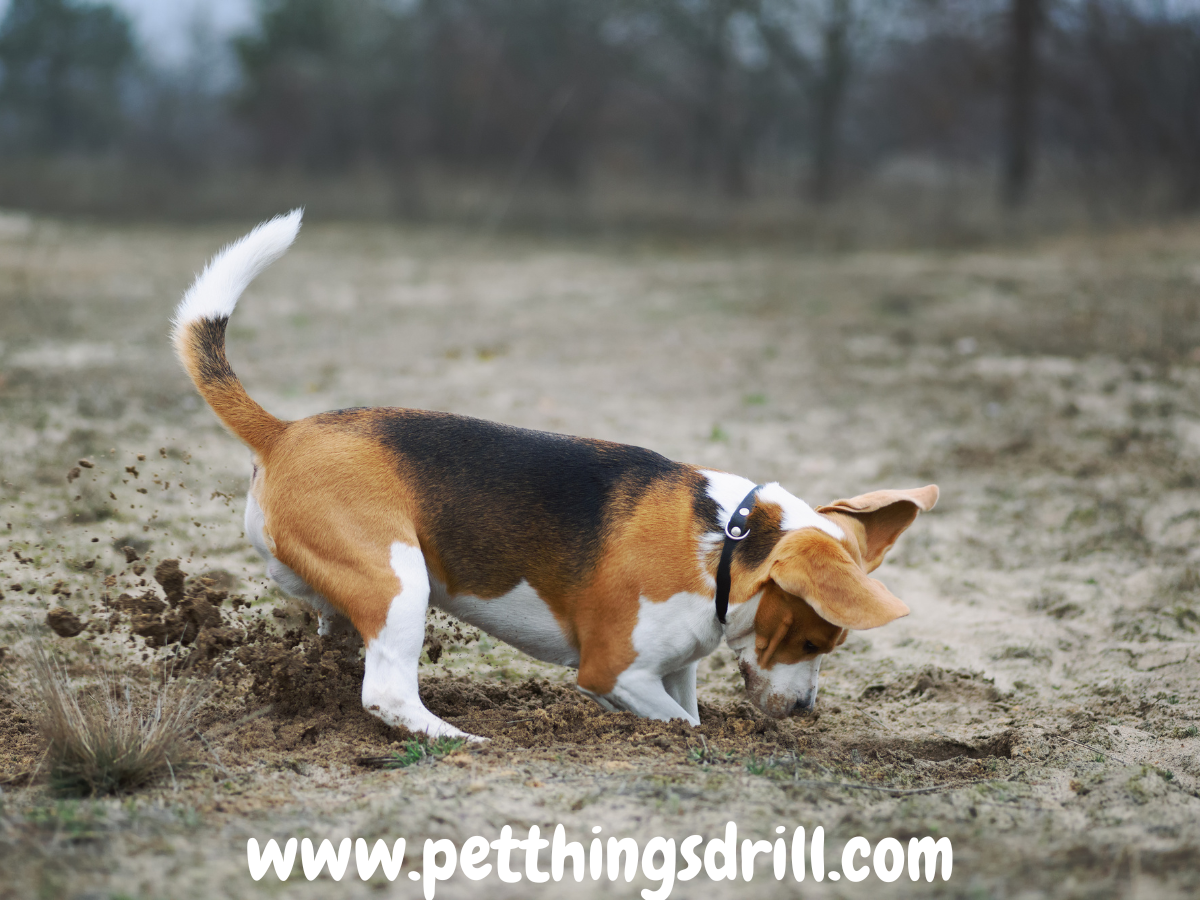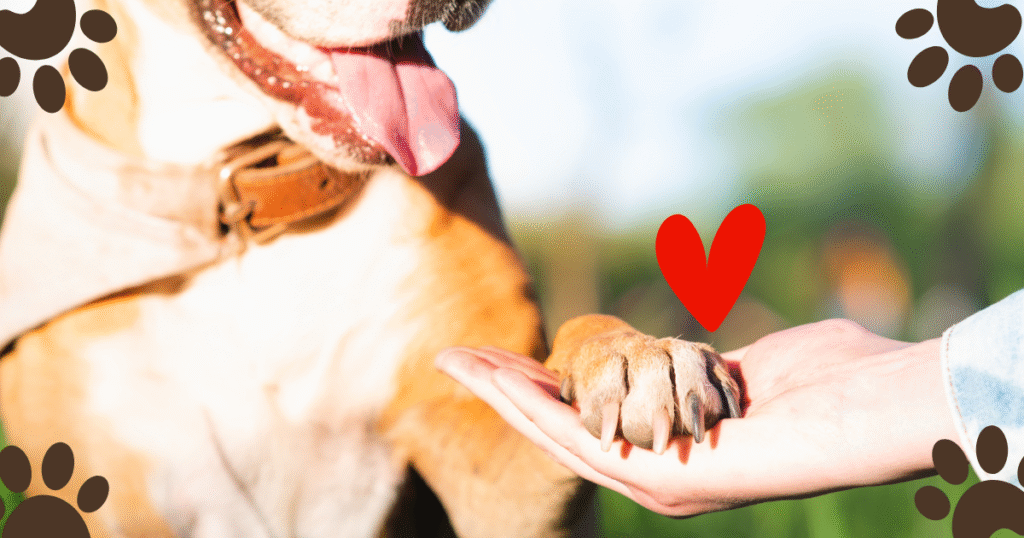
Dogs are mischievous characters of nature who win the hearts of their owners with their innocence and unbound love. Although some of their habits are purely adorable, there can be a few things that can raise your inhibitions. One of the issues is constant licking, chewing, and tugging of paws in dogs. I have seen many dog owners finding answers to the question why do dogs lick their paws? In this article, I will uncover major reasons and the potential harm of dogs licking their paws. Learn ways through which you can prevent the habit.
Why Do Dogs Lick Their Paws?
If you’ve found yourself wondering, “Why do dogs keep licking their paws?” you’re not alone. Paw licking in dogs is a common behavior, but it can stem from a variety of causes. Understanding why dogs lick their paws so much is essential for preventing further problems.
Common Reasons for Paw Licking:
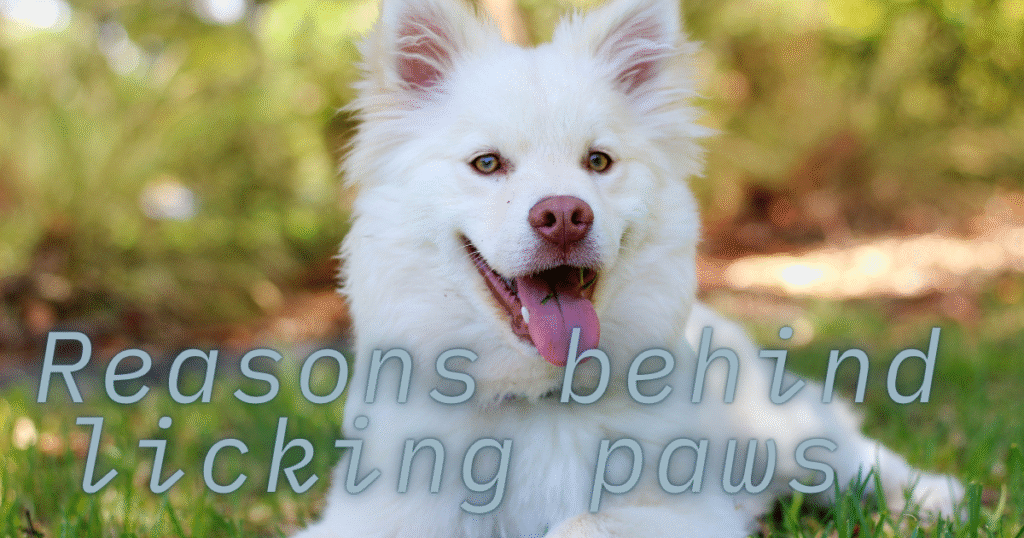
- Allergies
Dogs can suffer from allergies, just like humans. Food, pollen, grass, or certain cleaning chemicals can cause skin irritation or itchiness. Allergies might explain why dogs lick their front paws or why dogs lick their paws obsessively.
- Skin Infection
Bacterial or fungal infections are also culprits. These infections can create irritation, redness, or discharge, compelling dogs to lick the affected area constantly. This could be why dogs lick the bottoms of their paws or even the tops.
- Dry Skin
Sometimes, dryness triggers excessive licking. Environmental factors like cold weather or over-bathing can dry out a dog’s skin, leading to problems.
- Parasites
Fleas, ticks, and mites cause significant itching and irritation. This could explain why dogs excessively lick their paws or bite and chew on them.
- Pain or Irritation
Dogs may lick their paws and legs due to an external injury, a thorn, or even arthritis. If you’re wondering why do dogs lick at their paws or chew on them, investigate for physical discomfort or injury.
- Behavioral Issues
Anxious or stressed dogs may develop compulsive paw-licking behavior. Exploring why do dogs lick their paws constantly might lead to revelations about their emotional well-being.
- Grooming
Licking could simply be part of their self-cleaning habits. This might explain why dogs lick the top of their paws after playing outdoors.
Why Do Dogs Lick Their Paws A Lot?
When your dog licks their paws excessively, it’s crucial to determine whether it’s occasional grooming or something more serious. If your dog spends much of their time licking their paws, it may indicate an underlying issue that needs attention. Anxiety, injuries, or infections could answer the question of why do dogs lick their paws so much or obsessively.
Potential Dangers of Paw Licking
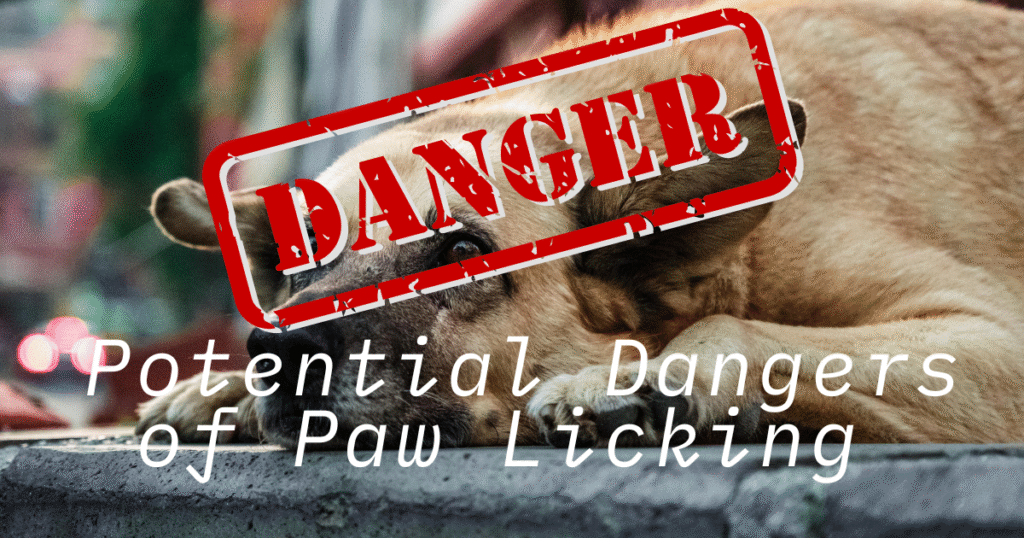
While paw licking might not sound dangerous in itself, doing so persistently can escalate into bigger problems.
- Inflammation and Infection
Constant licking irritates the skin, creating open sores. These areas may become breeding grounds for bacteria, leading to severe infections. If you’ve noticed why do dogs chew and lick their paws, an infection is a possibility.
- Compulsive Behavior
Habitual licking may turn into an obsessive-compulsive disorder over time. This repetitive action can worsen the issue and make treatment more challenging.
- Underlying Medical Conditions
If you find yourself repeatedly asking why do dogs lick their paws and legs, it’s worthwhile to consider if a more severe health issue, such as arthritis, might be at play.
- Harmful Chemicals
Dogs who lick their paws after stepping on harmful substances, such as salt on icy roads or cleaning chemicals, may ingest toxins. Why do dogs lick the bottoms of their paws? could relate to this exposure.
Addressing Excessive Paw Licking
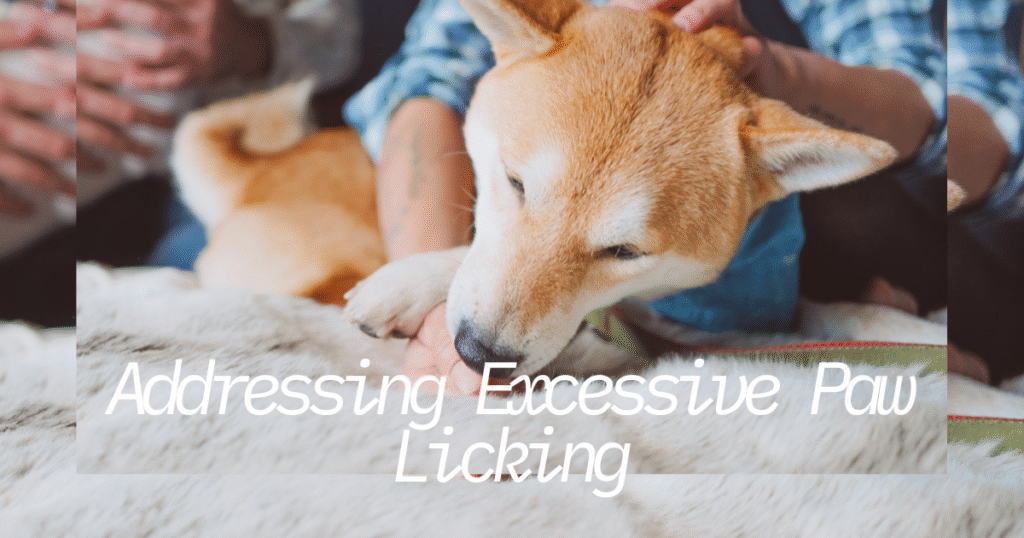
Understanding the root cause of why dogs excessively lick their paws is the first step to addressing the issue. Here are proactive measures you can take:
- Dietary Adjustments
If food allergies might explain why do dogs lick their paws and legs, speak to your vet about switching to a hypoallergenic diet. A deep analysis of your dog’s diet is very important in this case because it helps you rule out what to give him and what not to offer them.
- Regular Paw Inspections
Make it a habit to check your dog’s paws for any signs of irritation, injuries, or foreign objects like splinters or debris. Keeping their paws clean and free from potential irritants can help reduce the likelihood of licking.
- Environmental Changes
If environmental allergens seem to be the cause, consider cleaning your dog’s paws after walks, especially during high pollen seasons. Using a damp towel or pet-safe wipes can help remove allergens that might trigger discomfort.
- Veterinary Consultation
If the behavior persists despite your efforts, it’s essential to consult a veterinarian. Persistent paw licking can sometimes indicate underlying conditions, such as anxiety or more serious health concerns, which require professional attention.
- Vet Consultation
Persistent licking requires professional evaluation. Rule out infections, parasites, or other medical conditions. A visit to the vet is very beneficial because it gives you an overview of your doggo’s health
- Identify Allergies
Allergies are a common cause of excessive paw licking. Consider evaluating your pet’s diet or exposure to potential environmental irritants such as pollen, grass, or cleaning products. Discuss any observations with your veterinarian for appropriate allergy management.
- Provide Mental Stimulation
Excessive licking can sometimes stem from boredom or stress. Introduce engaging toys, puzzles, or exercise routines to keep your pet mentally and physically stimulated. A well-occupied pet is less likely to resort to destructive behaviors.
- Monitor Behavioral Changes
Pay close attention to any changes in your pet’s behavior or routine. Subtle shifts can provide clues about their health or emotional well-being and can be helpful when discussing concerns with a veterinarian.
- Environmental Allergies
Environmental factors, such as pollen, grass, mold, or dust mites, can also irritate, leading to paw licking. If you suspect allergies to be the culprit, try to identify and minimize contact with the potential allergens. Washing your dog’s paws after walks or providing them with booties can help reduce exposure.
- Dietary Sensitivities
Food allergies or sensitivities might also manifest as excessive licking or skin irritation. Talk to your veterinarian about your dog’s diet, and consider introducing an elimination diet to pinpoint potential triggers. Proper nutrition plays a vital role in maintaining your dog’s overall health and well-being.
- Regular Grooming and Hygiene
Keeping your dog’s paws clean and well-maintained is essential to prevent irritation or infections. Regularly inspect their paws for cuts, wounds, or foreign objects, and clean them gently with pet-safe wipes or warm water..
- Positive Reinforcement
If your dog licks excessively due to habit, use positive reinforcement to redirect their attention. Reward them with treats or affection when they stop licking and engage in healthier behavior.
- Exercise Regularly
A well-exercised dog is less likely to develop stress-related behaviors, including excessive licking. Take your dog on daily walks or engage in active play to help reduce stress and keep them healthy.
- Environmental Changes
Assess your dog’s surroundings for potential irritants, such as chemicals, cleaning products, or rough surfaces. Making adjustments to their environment may help alleviate discomfort and reduce licking.
- Preventative Measures
During winter, use paw wax or boots to protect your dog from irritating substances like road salt. For rainy seasons, dry their paws thoroughly to avoid fungal infections.
FAQs About Paw Licking in Dogs
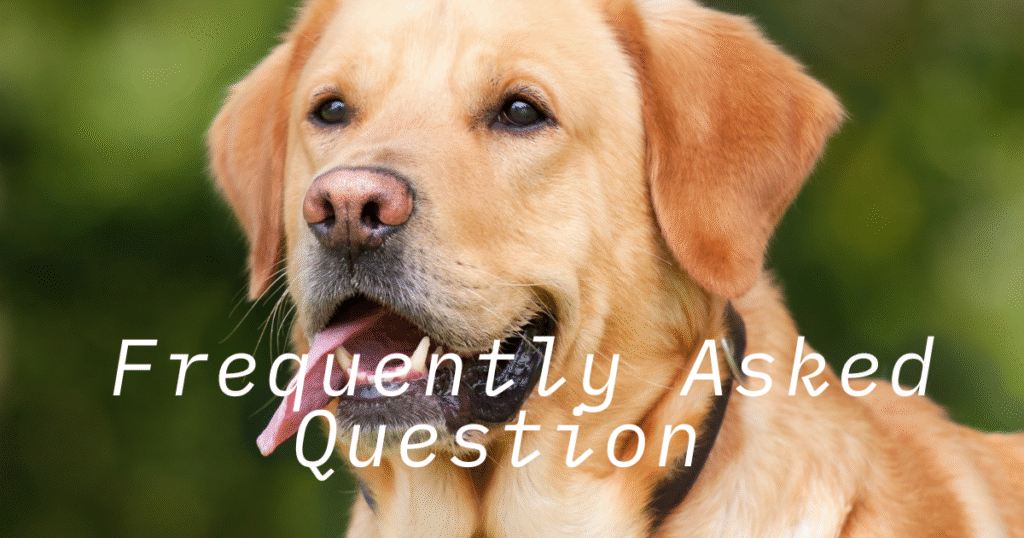
Why do dogs constantly lick their paws?
Constant paw licking can stem from allergies, infections, parasites, or behavioral issues. It’s crucial to observe whether the behavior occurs after specific triggers like walking outside or being in stressful situations.
How can I tell if paw licking is a serious problem?
If your dog’s paw licking is infrequent and doesn’t result in redness, swelling, or sores, it might not be a cause for concern. However, if the licking becomes excessive, persistent, or leads to visible signs of irritation, it could indicate an underlying health issue that requires attention from a veterinarian.
What are some home remedies for paw licking?
Home remedies can sometimes alleviate mild cases of paw licking. Washing your dog’s paws with warm water after walks can remove allergens or irritants. Applying a pet-safe paw balm can help soothe dry or cracked skin. If the licking is due to mild allergies, an oatmeal bath can provide relief. Always consult your veterinarian before attempting any home remedy, especially if symptoms persist.
When should I take my dog to the vet for paw licking?
You should take your dog to the vet if the paw licking is constant, has resulted in open wounds, or if you notice other symptoms such as limping, loss of appetite, or lethargy. A vet can examine your dog thoroughly and perform tests to diagnose the root cause, whether it’s an allergy, infection, or another condition, and recommend the best course of treatment.
Why do dogs chew and lick their paws?
Chewing and licking paws can be a sign of discomfort or irritation. Common causes include foreign objects stuck between the paw pads, injuries, or infections that cause pain. Behavioral factors, like anxiety or boredom, can also lead to excessive chewing. If the behavior persists, it’s important to consult with a veterinarian to identify the underlying issue and provide appropriate treatment.
Chewing and licking often signal irritation or pain. Look for signs of injury, pests, or infections. Such behavior might also indicate boredom or anxiety.
When should you be concerned about paw licking?
While occasional paw licking is normal, excessive or obsessive licking may indicate an underlying issue. If your dog’s paws appear red, swollen, or show signs of bleeding, or if the licking is accompanied by limping or changes in behavior, it’s time to consult a veterinarian. Persistent licking can also lead to secondary infections, making early intervention crucial.
How to address excessive paw licking
If you notice that your dog is excessively licking their paws, start by inspecting their feet thoroughly. Check for any visible injuries, foreign objects like splinters or thorns, or signs of irritation such as redness or swelling. Cleaning the paws gently with warm water can help remove potential irritants. If allergies are suspected, try to identify patterns in their environment or diet that could trigger the reaction. Providing mental stimulation and physical activities can also help alleviate boredom-related licking. However, if the behavior persists or worsens, always seek the guidance of a veterinarian to determine the root cause and appropriate treatment plan.
How to address excessive paw licking
To address excessive paw licking, start by identifying the root cause. Inspect your dog’s paws for visible injuries, foreign objects, or signs of irritation. If environmental allergens are suspected, wiping your dog’s paws after walks can help remove irritants. Providing mental stimulation and exercise may alleviate boredom-related licking. If anxiety is the cause, calming techniques such as consistent routines, soothing environments, or consulting a trainer might be beneficial. For persistent issues or uncertainty about the cause, seeking advice from a veterinarian ensures your dog receives the appropriate care.
How to help a dog that licks its paws excessively?
The first step is identifying the cause. If allergies are suspected, consider switching to a hypoallergenic diet or eliminating known allergens from the environment. For infections or parasites, your vet may recommend medication or topical treatments. Additionally, ensuring your dog has plenty of physical and mental stimulation can help alleviate boredom or anxiety-related licking. Always seek professional guidance to address the root cause effectively.
Why do dogs lick and chew their paws?
This behavior could double as a response to itchy skin or discomfort. Pay attention if your pet chews at specific times or if the area looks inflamed.
When to Consult a Veterinarian
If your dog’s paw chewing or licking becomes excessive, it’s important to consult a veterinarian. Persistent behavior may indicate underlying health issues such as allergies, fungal infections, or even arthritis. A professional can help determine the root cause and recommend appropriate treatments, ensuring your pet’s comfort and well-being.
Why do dogs lick their paws at night?
Licking at night may hint at anxiety or restlessness. It could also be more noticeable in the quiet of the evening. Environmental allergens accumulated during the day might also be a reason.
When should you see a vet about paw licking?
If your dog’s paw licking becomes frequent or obsessive, it may indicate an underlying health issue. Look for signs such as redness, swelling, bleeding, or foul odor, as these could point to infections, injuries, or allergies. Additionally, changes in your dog’s behavior or persistent discomfort should prompt a visit to the veterinarian to rule out any serious conditions. Catching the issue early can prevent further complications and ensure your pet’s comfort and health.
Why do dogs lick their paws after they eat?
Dogs may lick their paws after eating due to food allergies or minor allergic reactions. Consider the dog’s diet if this behavior occurs frequently.
Why do dogs lick and bite their paws?
Licking and biting are often associated with fleas, ticks, or skin irritation. Ensure your pet is on a proper flea and tick prevention program to minimize these issues.
Why do dogs lick the tops of their paws?
Dogs licking the tops of their paws may be responding to external irritants like grass, dirt, or chemicals. It could also be their natural way to clean themselves after being outside.
When Is It Time to See a Vet?
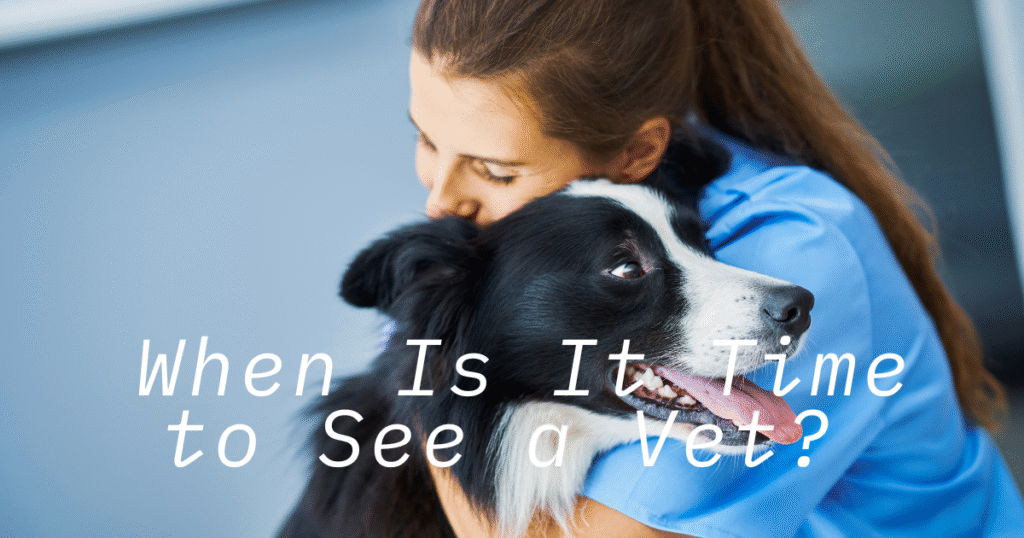
If you notice constant paw licking or other concerning symptoms like swelling, redness, or limping, visit a veterinarian. Professional diagnostic tools are essential to address why dogs lick the bottoms of their paws or excessively clean their legs.
Some conditions require immediate care. For example, tick-related issues can escalate quickly, or infections may worsen without timely treatment.
Final Thoughts
Now that we’ve unraveled the mystery of why do dogs lick their paws, it’s clear that this common habit can carry different meanings. While some reasons are benign, others call for careful observation, preventive measures, or medical attention. If your
dog is licking repeatedly, addressing these behavior patterns quickly is essential for their health and happiness.
By remaining vigilant and proactive, you can better understand your furry companion’s needs and foster their overall well-being.
